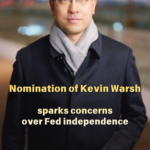Why the Dollar’s Reign Is Fading—and Why TikTok Won’t Save It
Think the US dollar’s decline started with recent trade wars? Think again. 🧠 Economic commentator Ge Lin unpacks the three simmering risks that have quietly chipped away at global trust in the greenback for years—like a viral trend that overstays its welcome. 🚨
1. 💸 Fiscal ‘YOLO’ Gone Wrong
Chronic overspending and a refusal to tackle debt? It’s not just a Gen-Z problem. The US’s fiscal discipline (or lack thereof) has left investors side-eyeing the dollar’s stability like a shaky influencer collab.
2. 🎩 The Fed’s Independence Crisis
Imagine the Federal Reserve as a judge pressured to fix a reality TV show—this politicization, Ge argues, has eroded its credibility. Spoiler: Markets hate plot twists in monetary policy. 📉
3. ⚔️ Weaponized Money = Trust Issues
Turning the dollar into a geopolitical sword might be backfiring harder than a TikTok ban. Countries are now quietly diversifying reserves like gamers switching consoles after a price hike. 🎮
Bottom line: The dollar isn’t dead, but its ‘main character energy’ is fading. Could this be the start of a multipolar currency era? 🌐💎
Reference(s):
cgtn.com







